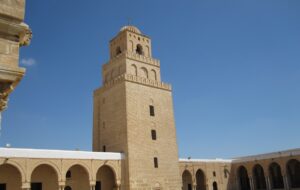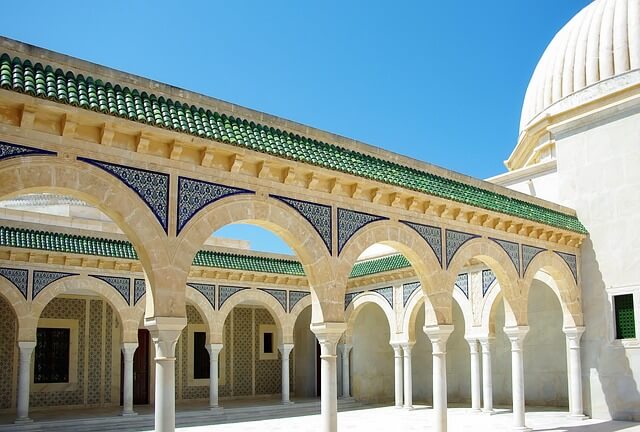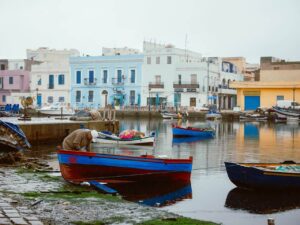Introduction to Tunisian Mosques
The mosque plays a central role in Tunisia’s culture and history. These sacred buildings are not only places of worship but also true architectural masterpieces that reflect centuries of traditions and diverse influences.
From the imposing structures of Kairouan to the more modest mosques in villages, each mosque tells a unique story. We will explore the most important Islamic temples, their spiritual significance, and their cultural importance for the Tunisian people.
Join us in discovering the most beautiful mosques in Tunisia, an artistic and spiritual heritage not to be missed during your trip.
History and Architecture of Mosques
Tunisian Muslim places of worship exhibit a variety of architectural styles that reflect the country’s different historical periods and cultural influences. The architecture combines Berber, Arab, Ottoman, and European elements.
Key Architectural Elements
- Minaret: Tower from which the muezzin calls to prayer.
- Mihrab: Niche indicating the direction of Mecca.
- Sahn: Inner courtyard for purification.
The earliest Tunisian mosques, such as the Great Mosque of Kairouan, were built using local materials like stone and bricks, following the principles of early Islamic architecture. Over the centuries, new techniques and styles were introduced, enriching the country’s architectural heritage.
The Most Beautiful Mosques in Tunisia

Tunisia is home to some of the oldest and most prestigious Islamic temples in the world. These are not just places of worship but also important centers of learning and culture.
List of Must-See Mosques
- Great Mosque of Kairouan: Considered one of the most important Islamic sites in the world, with a millennia-old history.
- Zitouna Mosque: Located in the heart of the medina of Tunis, it is one of the country’s main religious and cultural centers.
- Sidi Mahrez Mosque: An example of Ottoman architecture in Tunis, with Turkish and local influences.
The most beautiful mosques in Tunisia represent an artistic and spiritual treasure, offering a unique opportunity to delve into the country’s history and culture.
Cultural and Social Significance
The mosque is not just a place of prayer but also a center for social and cultural gathering. In Tunisia, this places have played a fundamental role in community life, promoting education, charity, and solidarity.
Social Role of Mosques
- Education: Many offer study courses and lessons on the Quran and Islamic culture.
- Charity: They collect funds and provide assistance to those in need.
- Community Events: They host religious celebrations and traditional festivals.
Visiting a mosque in Tunisia means connecting with the true essence of the country’s culture and spirituality.
Visiting Tips
When visiting mosques in Tunisia, it is important to follow certain etiquette and dress codes.
Essential Rules
- Dress Code: Wear modest clothing, covering shoulders and knees. Women should cover their heads with a scarf.
- Behavior: Respect silence and the sacredness of the place. Avoid taking photos during prayer.
- Access: In some mosques, access for non-Muslims may be restricted. Check the rules before visiting.
To learn more about Islamic culture, you can visit Islamicity.org.
FAQ
Frequently Asked Questions about Mosques in Tunisia
- What is the oldest mosque in Tunisia?
The Great Mosque of Kairouan is one of the oldest and most important in the Islamic world. - What are the dress code rules for visiting a mosque?
You must wear modest clothing, covering shoulders and knees. Women should cover their heads with a scarf. - Can I visit mosques if I am not Muslim?
Access may be restricted in some mosques. It is advisable to check the rules before visiting.
Conclusion
Exploring the most beautiful mosques in Tunisia offers a unique opportunity to immerse yourself in the country’s history, culture, and spirituality. Each mosque is an architectural and cultural treasure, a testament to centuries of traditions and diverse influences.
From the majestic Great Mosque of Kairouan to the historic Zitouna Mosque in Tunis, Tunisian mosques represent an invaluable heritage that deserves to be discovered and appreciated.
Here is a short video:





